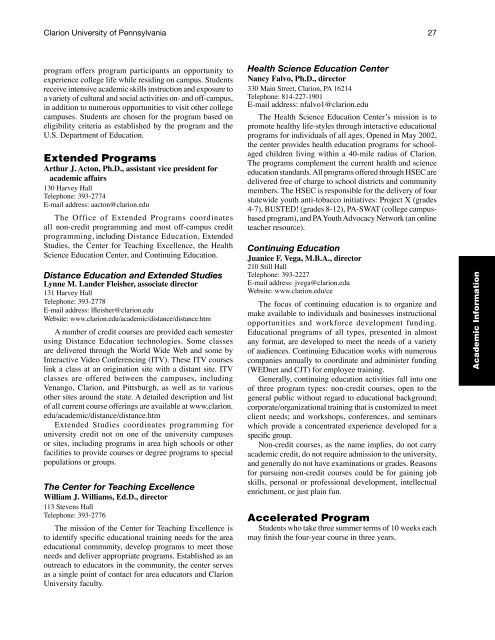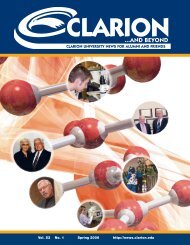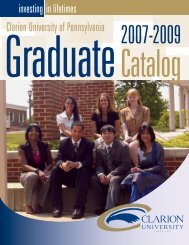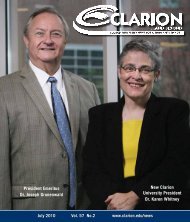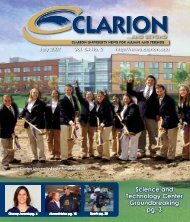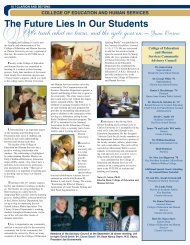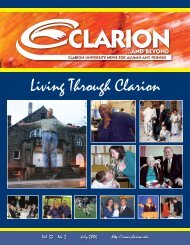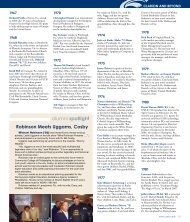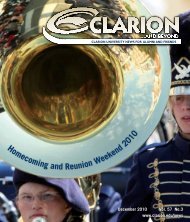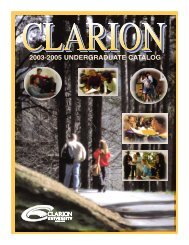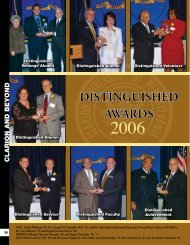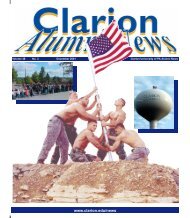Undergraduate - Clarion University
Undergraduate - Clarion University
Undergraduate - Clarion University
- No tags were found...
You also want an ePaper? Increase the reach of your titles
YUMPU automatically turns print PDFs into web optimized ePapers that Google loves.
<strong>Clarion</strong> <strong>University</strong> of Pennsylvania 27program offers program participants an opportunity toexperience college life while residing on campus. Studentsreceive intensive academic skills instruction and exposure toa variety of cultural and social activities on- and off-campus,in addition to numerous opportunities to visit other collegecampuses. Students are chosen for the program based oneligibility criteria as established by the program and theU.S. Department of Education.Extended ProgramsArthur J. Acton, Ph.D., assistant vice president foracademic affairs130 Harvey HallTelephone: 393-2774E-mail address: aacton@clarion.eduThe Office of Extended Programs coordinatesall non-credit programming and most off-campus creditprogramming, including Distance Education, ExtendedStudies, the Center for Teaching Excellence, the HealthScience Education Center, and Continuing Education.Distance Education and Extended StudiesLynne M. Lander Fleisher, associate director131 Harvey HallTelephone: 393-2778E-mail address: lfleisher@clarion.eduWebsite: www.clarion.edu/academic/distance/distance.htmA number of credit courses are provided each semesterusing Distance Education technologies. Some classesare delivered through the World Wide Web and some byInteractive Video Conferencing (ITV). These ITV courseslink a class at an origination site with a distant site. ITVclasses are offered between the campuses, includingVenango, <strong>Clarion</strong>, and Pittsburgh, as well as to variousother sites around the state. A detailed description and listof all current course offerings are available at www.clarion.edu/academic/distance/distance.htmExtended Studies coordinates programming foruniversity credit not on one of the university campusesor sites, including programs in area high schools or otherfacilities to provide courses or degree programs to specialpopulations or groups.The Center for Teaching ExcellenceWilliam J. Williams, Ed.D., director113 Stevens HallTelephone: 393-2776The mission of the Center for Teaching Excellence isto identify specific educational training needs for the areaeducational community, develop programs to meet thoseneeds and deliver appropriate programs. Established as anoutreach to educators in the community, the center servesas a single point of contact for area educators and <strong>Clarion</strong><strong>University</strong> faculty.Health Science Education CenterNancy Falvo, Ph.D., director330 Main Street, <strong>Clarion</strong>, PA 16214Telephone: 814-227-1901E-mail address: nfalvo1@clarion.eduThe Health Science Education Center’s mission is topromote healthy life-styles through interactive educationalprograms for individuals of all ages. Opened in May 2002,the center provides health education programs for schoolagedchildren living within a 40-mile radius of <strong>Clarion</strong>.The programs complement the current health and scienceeducation standards. All programs offered through HSEC aredelivered free of charge to school districts and communitymembers. The HSEC is responsible for the delivery of fourstatewide youth anti-tobacco initiatives: Project X (grades4-7), BUSTED! (grades 8-12), PA-SWAT (college campusbasedprogram), and PA Youth Advocacy Network (an onlineteacher resource).Continuing EducationJuanice F. Vega, M.B.A., director210 Still HallTelephone: 393-2227E-mail address: jvega@clarion.eduWebsite: www.clarion.edu/ceThe focus of continuing education is to organize andmake available to individuals and businesses instructionalopportunities and workforce development funding.Educational programs of all types, presented in almostany format, are developed to meet the needs of a varietyof audiences. Continuing Education works with numerouscompanies annually to coordinate and administer funding(WEDnet and CJT) for employee training.Generally, continuing education activities fall into oneof three program types: non-credit courses, open to thegeneral public without regard to educational background;corporate/organizational training that is customized to meetclient needs; and workshops, conferences, and seminarswhich provide a concentrated experience developed for aspecific group.Non-credit courses, as the name implies, do not carryacademic credit, do not require admission to the university,and generally do not have examinations or grades. Reasonsfor pursuing non-credit courses could be for gaining jobskills, personal or professional development, intellectualenrichment, or just plain fun.Accelerated ProgramStudents who take three summer terms of 10 weeks eachmay finish the four-year course in three years.pages i-viiAcademic Information


